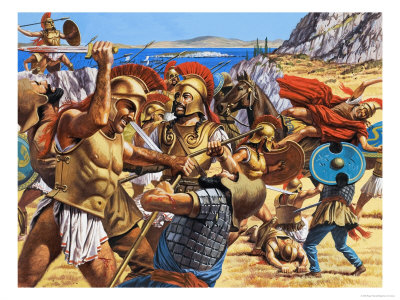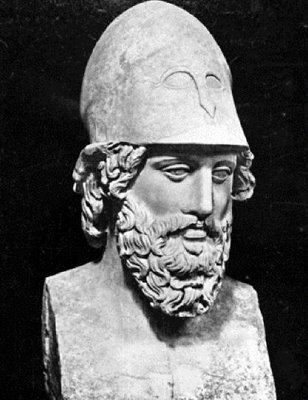This article discusses the “Other” side of Themistocles (c. 524–459 BCE), the Athenian general-politician who fought against the forces of Darius I (522-486 BCE) at the Battle of Marathon (August/September 490 BCE) (see Plutarch Aristides V.3) and ten years later commanded the Greek navies against Darius’ son Xerxes (r. 486-465 BCE) at the naval Battles of Artemesium (early August or early September, 480 BCE) and Salamis (September, 480 BCE).
 Painting by Roger Payne of the Battle of Marathon (August/September 490 BCE) (Source: Roger Payne, Windy Nook Primary). Not only did Themistocles partake in the fighting against the Achaemenid forces, he also may have been one of ten Greek Generals or “Strategoi” in that battle.
Painting by Roger Payne of the Battle of Marathon (August/September 490 BCE) (Source: Roger Payne, Windy Nook Primary). Not only did Themistocles partake in the fighting against the Achaemenid forces, he also may have been one of ten Greek Generals or “Strategoi” in that battle.
After his victory against Xerxes at the Battle of Salamis, Themistocles remianed a powerful figure in Greek politics, however he soon aroused the ire of his fellow Greeks. He was perhaps viewed as conceited (or egotistic) by the Athenians and certainly angered the Spartans when he ordered Athens to be re-fortified. By late 471 or 472 BCE, Themistocles was formally ostracized and forced into exile.
More accusations were hurled against Themistocles, especially by the Spartans who sent a delegation to Athens, which had already turned against him. The Athenians were convinced by the arguments of the Spartans, resulting in Themistocles being found guilty in absentia.
 A European painting of the Battle of Salamis by Wilhelm von Kaulbach (Source: Public Domain). Themistocles’ brilliant leadership of the Greek fleet proved decisive in defeating the naval armada of Xerxes.
A European painting of the Battle of Salamis by Wilhelm von Kaulbach (Source: Public Domain). Themistocles’ brilliant leadership of the Greek fleet proved decisive in defeating the naval armada of Xerxes.
Themistocles now had to flee Argos to then take refuge with Admetus, the king of Molossia. This did little to please the Greeks, who confiscated his properties in Greece.
The Athens-Sparta coalition soon demanded that Admetus surrender Themistocles to them. Admetus however, refused to yield to these demands. Instead, he gave Themistocles an escort to help him escape to Pydnus. In any event, Admentus could not guarantee Themistocles’ security.
 Themistocles (c. 524-459 BCE), the fierce opponent of Persia whom he later turned to for refuge (Source: Greece.com).
Themistocles (c. 524-459 BCE), the fierce opponent of Persia whom he later turned to for refuge (Source: Greece.com).
Themistocles then sailed to Ephesus, but had a very narrow escape at Naxos where the Athenian navy had been stationed, but as events turned out, the veteran of the Battle of Salamis arrived at Ephesus without interference. The choice of Ephesus was interesting as it was under Achaemenid Persian rule at the time.
Once in Ephesus, Themistocles was officially provided refuge with king Artaxerxes I (r. 465-424 BCE), the son of the same Xerxes whom the admiral had so brilliantly defeated at Salamis. While sources agree that Themistocles made contact with Artaxerxes, there are differing accounts as to whether this contact was by letter or face to face.
 A drawing depicting Artaxerxes I (465-424 BCE) bestowing a royal decree to Ezra in 457 BCE (Source: Dedication-50megs). Artaxerxes’ decree was essentially a re-affirmation of the polices of Cyrus the Great (r. 559-530 BCE) and Darius the Great (522-486 BCE) in favor of the Jews: ensuring that help would continue in rebuilding the temple. Artaxerxes’ decree also gave the Jews full rights to self government. The Jews were in fact allowed to establish their own judges, magistrates, and laws. Artaxerxes I also extended his magnanimity to Themistocles by granting him refuge from the ire of the Greeks. Themistocles found a safe haven and new home in Persia, despite having having fought against that same empire.
A drawing depicting Artaxerxes I (465-424 BCE) bestowing a royal decree to Ezra in 457 BCE (Source: Dedication-50megs). Artaxerxes’ decree was essentially a re-affirmation of the polices of Cyrus the Great (r. 559-530 BCE) and Darius the Great (522-486 BCE) in favor of the Jews: ensuring that help would continue in rebuilding the temple. Artaxerxes’ decree also gave the Jews full rights to self government. The Jews were in fact allowed to establish their own judges, magistrates, and laws. Artaxerxes I also extended his magnanimity to Themistocles by granting him refuge from the ire of the Greeks. Themistocles found a safe haven and new home in Persia, despite having having fought against that same empire.
Themistocles asked Artaxerxes I permission to learn the Persian language and customs for a full year to then enter king’s service. The request was granted by Artaxerxes I who also bestowed him authority over Magnesia (Tekin, modern Aydin province), Myos (Avshar, modern Aydin province), Lampsacus (Lapseke, modern Kanakkale province).
This would suggest a great historical irony: the hero of ancient Greece was forced to flee by his fellow Greeks to the land of the very enemy he had so spectacularly defeated.
It is generally agreed that Themistocles had promised Artaxerxes I that he would help the Achaemenids to conquer Greece. Thucydides (1.138.4) then reports the rumor that Themistocles poisoned himself because he was unable to fulfill his promise to Artaxerxes.



